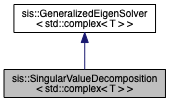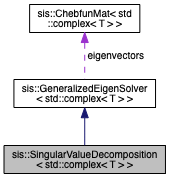This class computes various SingularValues of a differential block matrix operator using using it's adjoint. Class has various utilities, like computing the adjoint, adjoint boundary conditions, and also computing singular values of the frequency response operator. More...
#include <sis.hpp>


Public Member Functions | |
| SingularValueDecomposition () | |
| void | compute (const LinopMat< std::complex< T > > &A_, const BcMat< std::complex< T > > &Lbc_, const BcMat< std::complex< T > > &Rbc_, int num_vals) |
| Computes the singular values/functions of a Linear block matrix operator. More... | |
| void | compute (const LinopMat< std::complex< T > > &A_, const LinopMat< std::complex< T > > &B_, const LinopMat< std::complex< T > > &C_, const BcMat< std::complex< T > > &Lbc_, const BcMat< std::complex< T > > &Rbc_, int num_vals) |
| Computes singular values of the frequency response operator of a system in the input-output form, \begin{align} [\mathcal{A}\,\psi(\cdot)](y) \;&=\; [\mathcal{B}\,\boldmath{d}(\cdot)](y)\\ \phi(y) \;&=\; \mathcal{C}\,\psi(y), \end{align} . More... | |
| std::complex< T > | PowerSpectralDensity (const LinopMat< std::complex< T > > &A_, const LinopMat< std::complex< T > > &B_, const LinopMat< std::complex< T > > &C_, const BcMat< std::complex< T > > &Lbc_, const BcMat< std::complex< T > > &Rbc_) |
| Computes power spectral density from the frequency response operator of a system in the input-output form, \begin{align} [\mathcal{A}\,\psi(\cdot)](y) \;&=\; [\mathcal{B}\,\boldmath{d}(\cdot)](y)\\ \phi(y) \;&=\; \mathcal{C}\,\psi(y), \end{align} . Power spectral density is the sum of squares of the singular values. More... | |
| std::complex< T > | PowerSpectralDensity (const LinopMat< std::complex< T > > &A_, const LinopMat< std::complex< T > > &B_, const LinopMat< std::complex< T > > &C_, const BcMat< std::complex< T > > &Lbc_, const BcMat< std::complex< T > > &Rbc_, const BcMat< std::complex< T > > &Lbc_adjoint_, const BcMat< std::complex< T > > &Rbc_adjoint_) |
| std::valarray< std::complex< T > > | PowerSpectralDensityIndividual (const LinopMat< std::complex< T > > &A_, const LinopMat< std::complex< T > > &B_, const LinopMat< std::complex< T > > &C1_, const LinopMat< std::complex< T > > &C2_, const LinopMat< std::complex< T > > &C3_, const BcMat< std::complex< T > > &Lbc_, const BcMat< std::complex< T > > &Rbc_) |
| void | compute (const LinopMat< std::complex< T > > &A_, const LinopMat< std::complex< T > > &B_, const LinopMat< std::complex< T > > &C_, const BcMat< std::complex< T > > &Lbc_, const BcMat< std::complex< T > > &Rbc_, const BcMat< std::complex< T > > &Lbc_adjoint_, const BcMat< std::complex< T > > &Rbc_adjoint_, int num_vals) |
| Computes singular values of the frequency response operator of a system in the input-output form, \begin{align} [\mathcal{A}\,\psi(\cdot)](y) \;&=\; [\mathcal{B}\,\boldmath{d}(\cdot)](y)\\ \phi(y) \;&=\; \mathcal{C}\,\psi(y), \end{align} . When using this, you need to explicitly specify the adjoint boundary conditions. This is useful in certain discriptor systems. More... | |
| void | HinfNorm (const LinopMat< std::complex< T > > &E_, const LinopMat< std::complex< T > > &A_, const LinopMat< std::complex< T > > &B_, const LinopMat< std::complex< T > > &C_, const BcMat< std::complex< T > > &Lbc_, const BcMat< std::complex< T > > &Rbc_, const BcMat< std::complex< T > > &Lbc_adjoint_, const BcMat< std::complex< T > > &Rbc_adjoint_) |
| Computes the H-infinity norm of a system in the input-output form, \begin{align} [\mathcal{I\omega E - A}\,\psi(\cdot)](y) \;&=\; [\mathcal{B}\,\boldmath{d}(\cdot)](y) \phi(y) \;&=\; \mathcal{C}\,\psi(y), \end{align} . Still needs validation and improvement. Works only for the evolution form. More... | |
| LinopMat< std::complex< T > > | Adjoint (const LinopMat< std::complex< T > > &Lmat_) |
| Computes the formal adjoint of a Linear operator. This is a differential adjoint, and not the conjugate transpose of the operators in the LinopMat. To get the latter, use cTranspose(); Adjoints are for generic discriptor systems, like \(M\partial_{t}\phi(y) = L\phi(y)\). More... | |
| BcMat< std::complex< T > > | AdjointBc_analytical (const LinopMat< std::complex< T > > &Lmat_, const BcMat< std::complex< T > > &Lbc_, const BcMat< std::complex< T > > &Rbc_) |
| Computes adjoint boundary conditions analytically, needs boundary conditions all right boundary conditions in rbc, and all left boundary conditions in lbc. All dependent variables need not have boundary conditions specified, but it is essential that the number of boundary conditions be equal to the sum of derivatives of all independent variables, and all the boundary conditions be linearly independent. The adjoint boundary conditions will be returned in the output, as BcMat, will all boundary conditions for left and right in it, in the orders left followed by right. More... | |
 Public Member Functions inherited from sis::GeneralizedEigenSolver< std::complex< T > > Public Member Functions inherited from sis::GeneralizedEigenSolver< std::complex< T > > | |
| GeneralizedEigenSolver () | |
| Null constructor. More... | |
| void | compute (const LinopMat< std::complex< T > > &Lmat_, int num_vals, const BcMat< std::complex< T > > &bc_) |
| Call this with an input Linear operator to solve for eigenvalues and vectors. The number of Eigen values/vectors is num_vals, num_vals has to be less than N*r. More... | |
| void | compute (const LinopMat< std::complex< T > > &Lmat_, const BcMat< std::complex< T > > &bc_) |
| Call this with an input Linear operator to solve for eigenvalues and vectors. More... | |
| void | compute (const LinopMat< std::complex< T > > &Lmat_, const LinopMat< std::complex< T > > &Mmat_, int num_vals, const BcMat< std::complex< T > > &Lbc_) |
| The main solver for LinopMat. Read about class BcMat to see how this works, also see examples example/Ex_16.cpp and test/Visco_3D_pipe.cpp of how this is applied. This function is useful when boundary conditions are mixed between variables. Also, if you have boundary conditions that have an associated eigenvalue, see compute_with_constraints. More... | |
| void | computeAppend (const LinopMat< std::complex< T > > &Lmat_, const LinopMat< std::complex< T > > &Mmat_, int num_vals, const BcMat< std::complex< T > > &Lbc_) |
| Another main solver for LinopMat, a minimal solver for eigenvalues only. LAPACK needs to be linked to use this, and SIS_USE_LAPACK has to be defined. More... | |
| void | compute_with_constraints (const LinopMat< std::complex< T > > &Lmat_, const LinopMat< std::complex< T > > &Mmat_, int num_vals, const BcMat< std::complex< T > > &Lbc_, const BcMat< std::complex< T > > &Mbc_) |
| void | sortByLargestReal () |
| This function will sort the eigenvalues and vectors by the largest real part. More... | |
| void | keepConverged () |
| This will remove all unconverged and infinite eigenvalues from the list. More... | |
| void | keep (int n) |
| This will keep only n and remove the rest. Use this carefully. Only first n will be kept, irrespective of convergence. More... | |
| void | removeInf () |
| This will remove all infinite eigenvalues. Useful when solving generalized eigenvalue problems. More... | |
| void | compute (const Eigen::Matrix< std::complex< T >, Eigen::Dynamic, Eigen::Dynamic > &L_, const Eigen::Matrix< std::complex< T >, Eigen::Dynamic, Eigen::Dynamic > &M_, Discretize< std::complex< T > > Dis) |
| This is used to use a discretization to compute eigenvalues. More... | |
Public Attributes | |
| int | svd_flag |
| int | isSingular |
| double | gamma_opt |
| This is the H-infinity norm. More... | |
| double | omega_opt |
| This is the value of \(\omega\) at which H-infinity norm occurs. More... | |
 Public Attributes inherited from sis::GeneralizedEigenSolver< std::complex< T > > Public Attributes inherited from sis::GeneralizedEigenSolver< std::complex< T > > | |
| ChebfunMat< std::complex< T > > | eigenvectors |
| Eigen::Matrix< std::complex< T >, Eigen::Dynamic, 1 > | eigenvalues |
| Eigen::Matrix< int, Eigen::Dynamic, 1 > | MPorNot |
| int | converged |
| Number of eigenvalues that have converged to machine precision. More... | |
Detailed Description
template<class T>
class sis::SingularValueDecomposition< std::complex< T > >
This class computes various SingularValues of a differential block matrix operator using using it's adjoint. Class has various utilities, like computing the adjoint, adjoint boundary conditions, and also computing singular values of the frequency response operator.
Constructor & Destructor Documentation
◆ SingularValueDecomposition()
|
inline |
Member Function Documentation
◆ Adjoint()
|
inline |
Computes the formal adjoint of a Linear operator. This is a differential adjoint, and not the conjugate transpose of the operators in the LinopMat. To get the latter, use cTranspose(); Adjoints are for generic discriptor systems, like \(M\partial_{t}\phi(y) = L\phi(y)\).
Definition at line 11327 of file sis.hpp.
References sis::diff(), sis::pow(), and sis::LinopMat< T >::resize().
◆ AdjointBc_analytical()
|
inline |
Computes adjoint boundary conditions analytically, needs boundary conditions all right boundary conditions in rbc, and all left boundary conditions in lbc. All dependent variables need not have boundary conditions specified, but it is essential that the number of boundary conditions be equal to the sum of derivatives of all independent variables, and all the boundary conditions be linearly independent. The adjoint boundary conditions will be returned in the output, as BcMat, will all boundary conditions for left and right in it, in the orders left followed by right.
Definition at line 11505 of file sis.hpp.
References sis::diff(), sis::feval2D(), sis::N, sis::pow(), sis::setChebPts(), and SIS_PHYS_SPACE.
◆ compute() [1/3]
|
inline |
Computes the singular values/functions of a Linear block matrix operator.
Definition at line 10295 of file sis.hpp.
References sis::SingularValueDecomposition< T >::Adjoint(), sis::SingularValueDecomposition< T >::AdjointBc_analytical(), and sis::SingularValueDecomposition< T >::compute().
◆ compute() [2/3]
|
inline |
Computes singular values of the frequency response operator of a system in the input-output form,
\begin{align} [\mathcal{A}\,\psi(\cdot)](y) \;&=\; [\mathcal{B}\,\boldmath{d}(\cdot)](y)\\ \phi(y) \;&=\; \mathcal{C}\,\psi(y), \end{align}
.
Definition at line 10404 of file sis.hpp.
References sis::SingularValueDecomposition< T >::Adjoint(), sis::SingularValueDecomposition< T >::AdjointBc_analytical(), sis::SingularValueDecomposition< T >::compute(), sis::N, SIS_SVD, SIS_SVD_LEFT, and SIS_SVD_RIGHT.
◆ compute() [3/3]
|
inline |
Computes singular values of the frequency response operator of a system in the input-output form,
\begin{align} [\mathcal{A}\,\psi(\cdot)](y) \;&=\; [\mathcal{B}\,\boldmath{d}(\cdot)](y)\\ \phi(y) \;&=\; \mathcal{C}\,\psi(y), \end{align}
. When using this, you need to explicitly specify the adjoint boundary conditions. This is useful in certain discriptor systems.
Definition at line 10901 of file sis.hpp.
References sis::SingularValueDecomposition< T >::Adjoint(), sis::SingularValueDecomposition< T >::compute(), sis::N, SIS_SVD, SIS_SVD_LEFT, and SIS_SVD_RIGHT.
◆ HinfNorm()
|
inline |
Computes the H-infinity norm of a system in the input-output form,
\begin{align} [\mathcal{I\omega E - A}\,\psi(\cdot)](y) \;&=\; [\mathcal{B}\,\boldmath{d}(\cdot)](y) \phi(y) \;&=\; \mathcal{C}\,\psi(y), \end{align}
. Still needs validation and improvement. Works only for the evolution form.
◆ PowerSpectralDensity() [1/2]
|
inline |
Computes power spectral density from the frequency response operator of a system in the input-output form,
\begin{align} [\mathcal{A}\,\psi(\cdot)](y) \;&=\; [\mathcal{B}\,\boldmath{d}(\cdot)](y)\\ \phi(y) \;&=\; \mathcal{C}\,\psi(y), \end{align}
. Power spectral density is the sum of squares of the singular values.
Definition at line 10580 of file sis.hpp.
References sis::SingularValueDecomposition< T >::Adjoint(), and sis::SingularValueDecomposition< T >::AdjointBc_analytical().
◆ PowerSpectralDensity() [2/2]
|
inline |
Definition at line 10676 of file sis.hpp.
References sis::SingularValueDecomposition< T >::Adjoint().
◆ PowerSpectralDensityIndividual()
|
inline |
Definition at line 10781 of file sis.hpp.
References sis::SingularValueDecomposition< T >::Adjoint(), and sis::SingularValueDecomposition< T >::AdjointBc_analytical().
Member Data Documentation
◆ gamma_opt
| double sis::SingularValueDecomposition< std::complex< T > >::gamma_opt |
◆ isSingular
| int sis::SingularValueDecomposition< std::complex< T > >::isSingular |
◆ omega_opt
| double sis::SingularValueDecomposition< std::complex< T > >::omega_opt |
◆ svd_flag
| int sis::SingularValueDecomposition< std::complex< T > >::svd_flag |
The documentation for this class was generated from the following file:
- includes/sis.hpp
